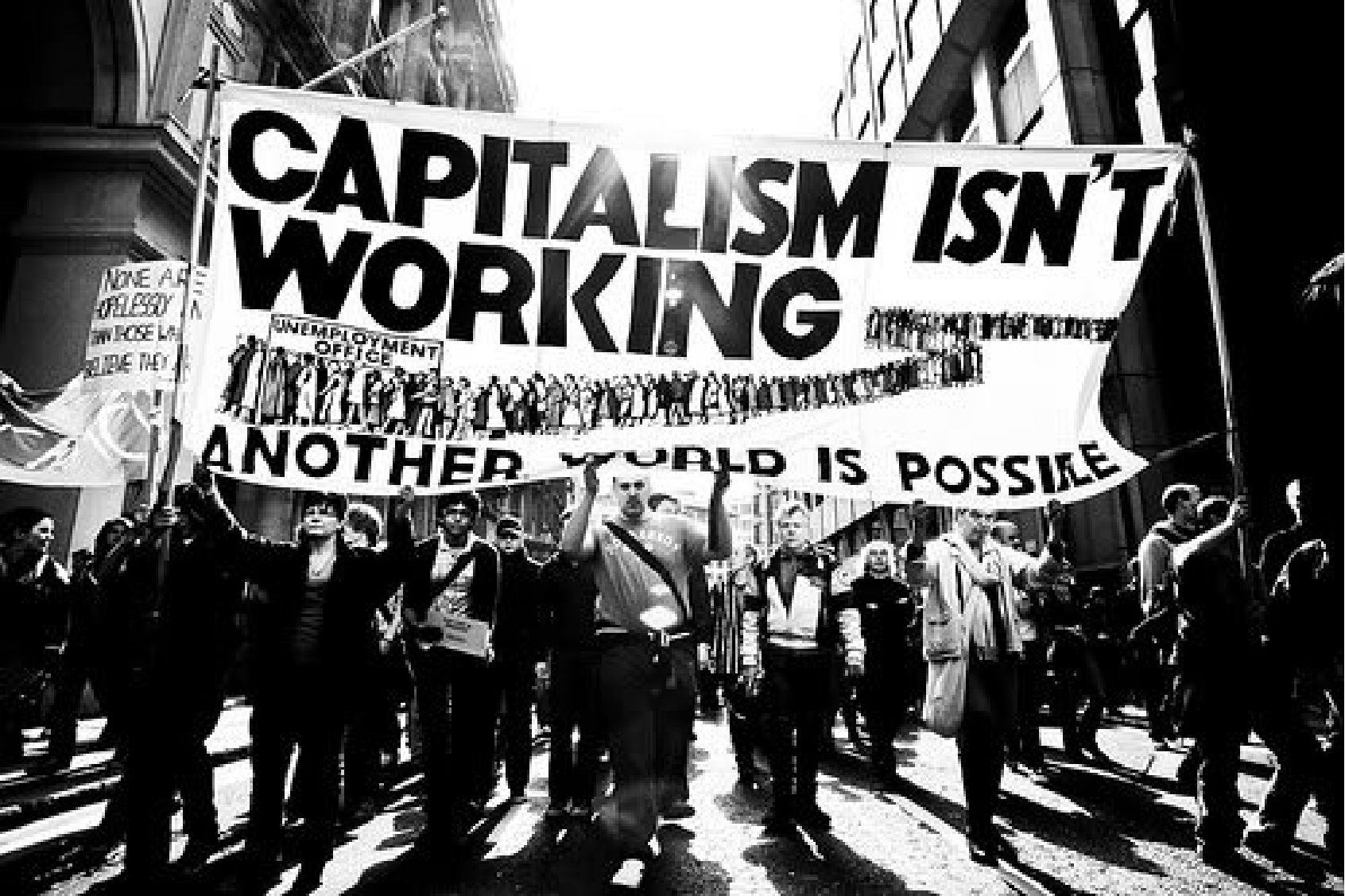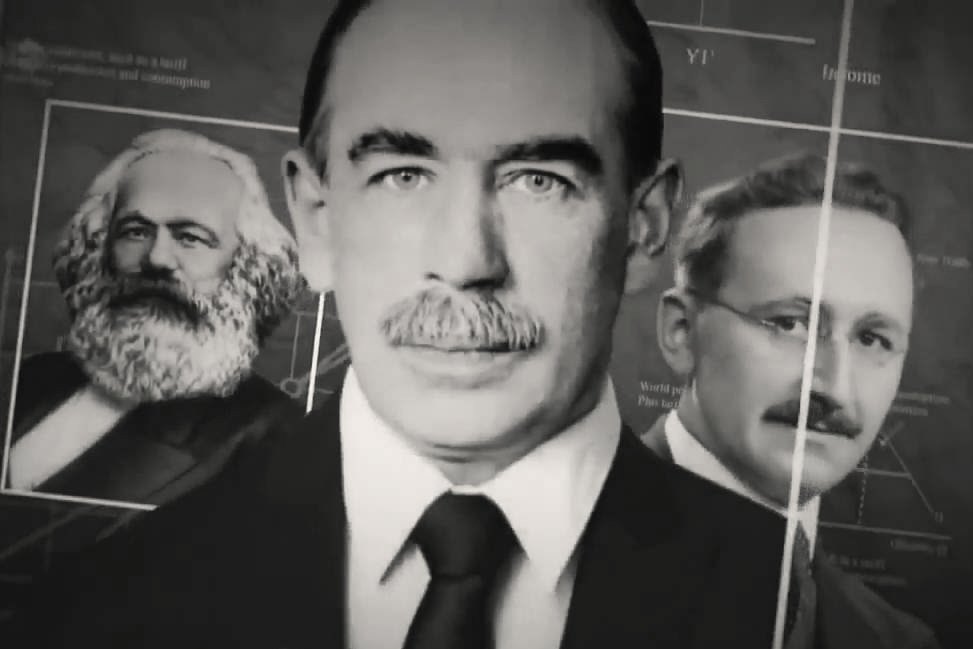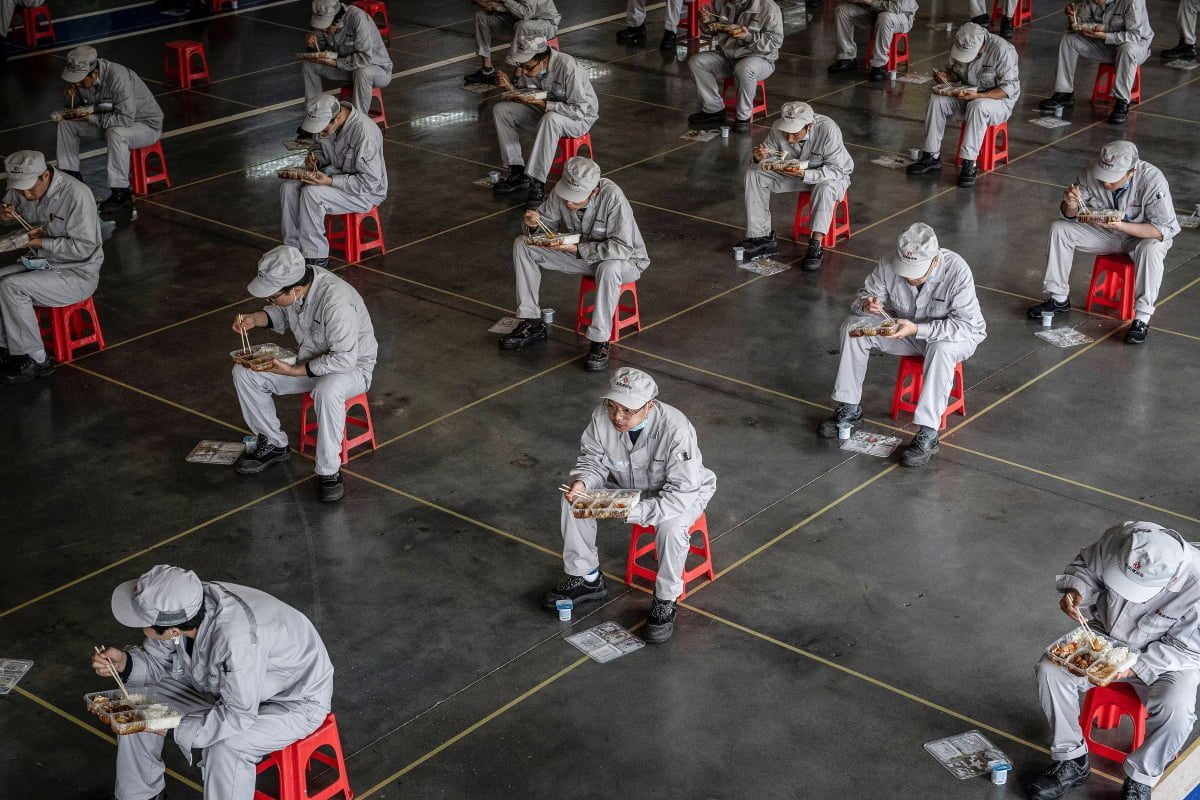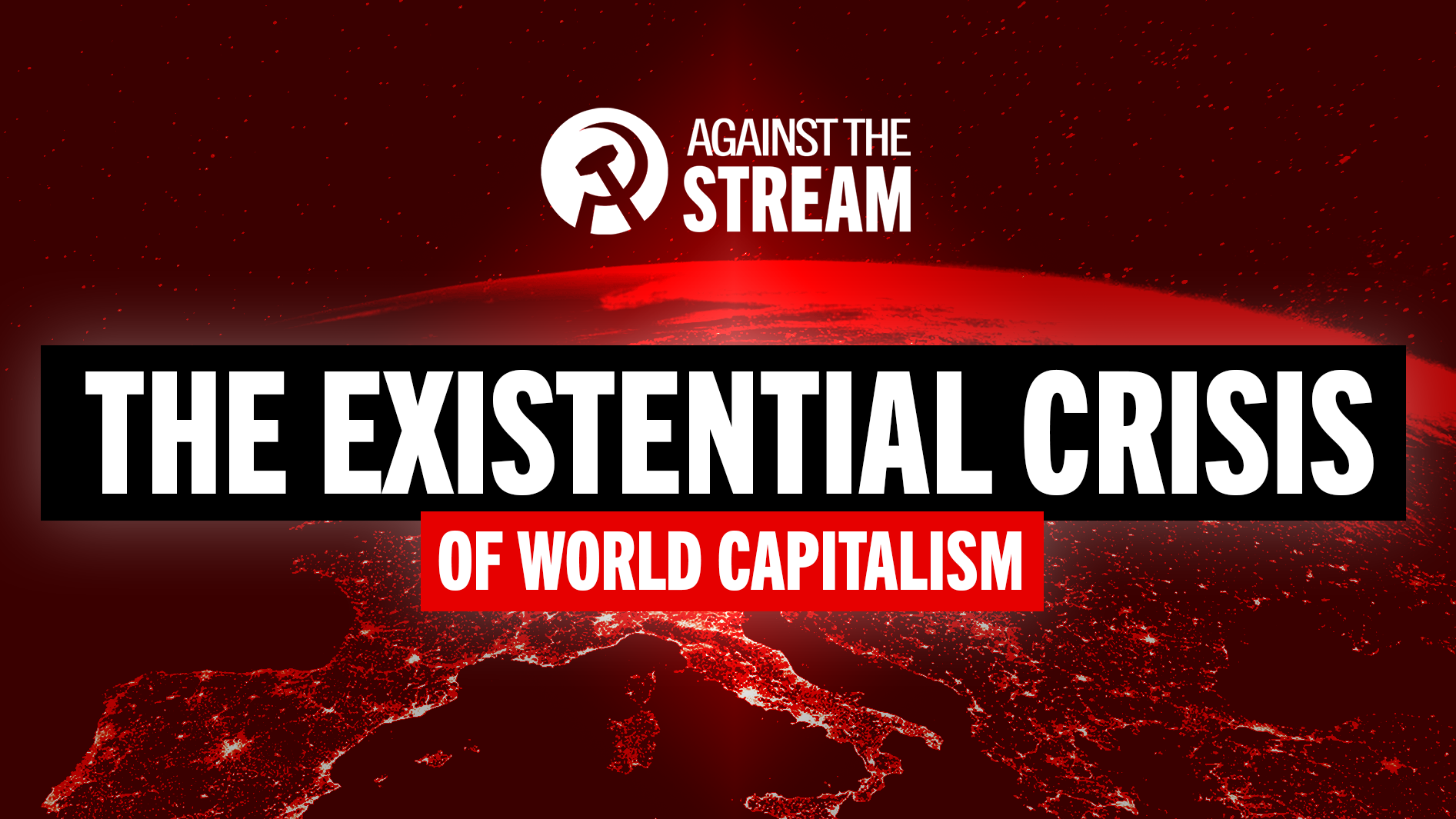The pandemic has triggered an unprecedented crisis of capitalism. The ruling class has no solution for how to get out of this. Consciousness will be shaken and transformed by these events. We must prepare for world revolution.
“On the other hand, there exist symptoms of decay, far surpassing the horrors recorded of the latter times of the Roman Empire. In our days, everything seems pregnant with its contrary.” – Karl Marx
There are moments in history that can be considered decisive. We are now living through such a turning point in history.
It is natural to look for reference points or parallels. But nothing seems to really fit what we are experiencing. The Bank of England has said this will be the deepest crisis for 300 years, which tells you a lot about the situation. Three hundred years is a breath-taking conclusion.
Some have drawn parallels with the Black Death of the fourteenth century, which contributed to the demise of feudalism. Others have pictured scenes from Dante’s inferno.
But there are no parallels or lessons from the past. The situation we are experiencing is unique. The speed of the collapse is astonishing. It took a few years after the 1929 Crash for mass unemployment to develop in the United States. Now, within a few months or weeks, unemployment in the USA has already reached 40 million. Again, there are no parallels.
Accident and necessity
The bourgeoisie are at a complete loss. They were shocked by the collapse. Their strategists were reduced to reading the ‘entrails’ to further their understanding. It was a crisis that was not supposed to happen. They are like the Bourbons: they have learned nothing and forgotten everything.
They have concentrated on the idea that it was all the fault of the coronavirus. But this crisis was long in the making. There was already a steep slowdown in the world economy and there was much talk of a possible recession. The virus was a trigger and not the cause of this capitalist crisis.
However, as Hegel explained, necessity expresses itself through accident. The virus was not simply the ‘trigger’ for the current crisis, but has created a devastating loop effect. Cause becomes effect – but effect also becomes cause, and so on. The virus compounded the crisis, driving it ever deeper, bringing out all the contradictions and exacerbating them.
How can the capitalist plan ahead or think of investing, when everything around them is collapsing? Furthermore, there is the ever-present danger that there is a new outbreak of the virus, which will precipitate a new collapse. Their attempts to reopen parts of the economy in different countries, each vying with the other, is dicing with death, literally, with potentially catastrophic consequences.
Consciousness amongst the broad mass – in fact, amongst all classes – is being hammered. They have never experienced anything like it. It is a combination of shock and anger. Consciousness, which is normally very conservative, will be transformed and re-transformed. This will not be in a straight line, but in leaps and convulsions. This opens up a revolutionary perspective.
New epoch
 Since 1945 and the world upswing, capitalism has experienced unprecedented growth. There were many reasons for this, which were analysed by Ted Grant in his Will There be a Slump?, written in 1960.
Since 1945 and the world upswing, capitalism has experienced unprecedented growth. There were many reasons for this, which were analysed by Ted Grant in his Will There be a Slump?, written in 1960.
If there was a key to this spiral of economic development, it was the development of world trade and the world market. At that time, the United States was able to impose a new world order. This was in marked contrast to the Depression and mass unemployment of the 1930s.
This staggering development of capitalism since the war, over such a long period of time, served to shape consciousness. It strengthened reformism and isolated the forces of Marxism, which were reduced to a tiny handful.
That epoch is over. We have entered an epoch of unprecedented crisis on a world scale. This now will shape the consciousness, especially of the new generations. It is this that is preparing explosions.
Already, the 2008 capitalist crisis, which was as deep as the 1930s, if not deeper, ushered in a new period of austerity and political backlash.
Everywhere they are alarmed at the rise of “populism”. We had the phenomenon of the rise of Donald Trump, on the right, but also of Bernie Sanders and Jeremy Corbyn, on the left. They are now terrified that this will intensify in the next period. The dilemma faced by the bourgeoisie was summed up by the Financial Times, the sober organ of British finance capital:
“Paying for the pandemic will raise all the same questions. A return to austerity would be madness — an invitation to widespread social unrest, if not revolution, and a godsend for the populists,” it explained. “Over time — a long time — the fiscal bills will have to be paid. Liberal democracy, however, will survive this second great economic shock only if the adjustments are made within the context of a new social contract that recognises the welfare of the majority over the interests of the privileged.” (Financial Times, 9/3/20)
They do not want to return to austerity. But in reality we never left it. This is a forlorn hope, as the mountain of debt being piled up and the extreme fiscal deficits will inevitably mean drastic cuts and austerity. This, in turn, will cut demand and exacerbate the crisis. But they have no alternative. They are struck between a rock and a hard place.
Of course, at the present time, where they fear losing everything, they are prepared to abandon all the talk of balanced budgets of yesterday, and throw trillions into saving the capitalist system. They are even pumping money into the health service, and subsiding the capitalists on an unprecedented scale. The amounts they are pouring into the economy are far greater than in 2008-09, reflecting the gravity of the situation.
Limits of Keynesianism
 There are fundamentally two schools of bourgeois economics: firstly, monetarism; and secondly, Keynesianism. In the past period, for about 40 years, the monetarists were dominant. Now, out of necessity, they have lurched towards Keynesianism and deficit-financing on a massive scale.
There are fundamentally two schools of bourgeois economics: firstly, monetarism; and secondly, Keynesianism. In the past period, for about 40 years, the monetarists were dominant. Now, out of necessity, they have lurched towards Keynesianism and deficit-financing on a massive scale.
But there are limits to all things, including Keynesian measures. We saw the limits in Roosevelt’s New Deal in the 1930s, which softened things for a while, but never solved the crisis, which returned in August 1937.
Hitler’s war economy was also a form of Keynesianism, spending massive amounts on infrastructure and the war industries. This meant, at a certain point, either going to war or economic collapse.
Today, Keynesianism means building up mountains of unprecedented debts everywhere. These will have to be reduced. This can only be achieved by economic growth, as was seen after the Second World War. But this is ruled out. The economic perspective is certainly not of upswing, but of downswing and prolonged depression.
Failing this, the only other route is drastic cuts to social spending, wages, and heightened austerity. It will be those considered ‘frontline’ workers today who will face the brunt of these attacks. This situation will last for decades – or however long capitalism is allowed to exist. There is no middle road.
Ironically, his Keynesian onslaught is precisely what the left reformists were demanding everywhere. They were going to borrow and spend their way out of the crisis!
It reflects their bankruptcy, that these ‘realists’ can only operate on the basis of capitalism. They have abandoned the perspective of socialism for a kinder, softer, more humane capitalism, which does not exist. Then they accuse the Marxists of being utopian, when it is they in fact who are the greatest utopians.
Only socialist planning – nationally and internationally – can offer the way forward. That means the overthrow of capitalism by the working class and the introduction of a workers’ democracy.
Beggar thy neighbour
The future on a capitalist basis looks extremely dangerous. Henry Kissinger, the veteran American strategic thinker, has argued that the crisis has exposed the limitations of our current institutions.
“When the COVID-19 pandemic is over, many countries’ institutions will be perceived as having failed,” he wrote in the Wall Street Journal. But it is not simply the institutions of capitalism that will have been seen to have failed, but the very system of capitalism itself.
There is much bleating about the need for ‘leadership’. But they have their leadership: Donald Trump. He represents the trend of economic nationalism, the tendency that caused the Great Depression with the introduction of ‘beggar thy neighbour’ policies of tariffs and competitive devaluations.
Trump’s policy is ‘America First’, which he has presumed aggressively. He has imposed tariffs against China and Europe of different goods, especially steel. He boldly announced that a trade war was “good”.
Economic nationalism at this time will only intensify the crisis. His ferocious attacks on China are very dangerous in this regard. As we mentioned earlier, effect becomes cause and cause becomes effect in a downward spiral. This means we are heading for a Depression, the likes of which we have never seen.
This new objective situation is a reflection of the fact that the productive forces – namely, industry, technique and science – have been hemmed in by the nation state and private ownership of the means of production. These have become an absolute fetter on development. This is no secondary crisis, but an organic crisis: an inherent crisis of the capitalist system.
World revolution
 This crisis is having a major impact on consciousness. But this is only the beginning. The world is going to be turned upside down. This will dramatically affect class consciousness and the class struggle.
This crisis is having a major impact on consciousness. But this is only the beginning. The world is going to be turned upside down. This will dramatically affect class consciousness and the class struggle.
Of course, there is always a lag, then a leap forward. Given the depth of the economic crisis, and the shock, it may take a bit of time for this to express itself in strikes and class battles. But it will sooner or later manifest itself in revolutionary convulsions. We have certainly entered the most disturbed and turbulent period in human history.
A symptom of this are the revolutionary upheavals that are shaking the United States, following years of frustration. This has provoked the biggest split in the ruling class since the Civil War. In many ways, the American revolution has begun!
In the past, the forces of genuine Marxism have been isolated in the labour movement. Now that the winds of the class struggle will again blow – reaching gale force on occasions – the situation is being transformed.
The basis is being laid for the rapid development of Marxism over the next 5 or 10 years. The sects are in crisis everywhere, a product of their failed perspectives and bankrupt methods.
More importantly, in the past, the biggest obstacle to the development of genuine Marxism was the strength of Stalinism in Britain and internationally, which held sway among the advanced workers. They dominated the labour and trade union movement, and acted as an enormous brake, reinforcing reformism as well as the poison of nationalism.
Fortunately, that obstacle has now collapsed. The Stalinist organisations are of no importance, reduced to small grouplets. In Italy, the Communist Party had two million members, but today it no longer exists. While Stalinist remnants remain largely in the trade union bureaucracies, they are nothing compared to the past.
This is of colossal importance to the British revolution. It means the way has been cleared for the Marxist tendency in Britain and internationally.
“A spectre is haunting Europe,” states the Communist Manifesto, “the spectre of Communism.” This is what the ruling class fears, faced with this meltdown of the capitalist system. What is being prepared, is not revolution in this or that country, but world revolution.
As Trotsky once commented, those who are looking for a comfortable peaceful life, have chosen the wrong time to be born.
“The crisis facing mankind is a crisis of leadership”, explained Trotsky in the Transitional Programme. Building this leadership still remains the task facing us. Under the banner of Marxism, with its clear programme, strategy and tactics, this can be resolved.
Never in our lifetimes has there been such a favourable situation as now. One successful socialist revolution in one country will set the world aflame. One victory would set off a chain reaction and lay the basis for a socialist Britain and a Socialist United States of Europe, as the stepping stone towards a world federation of socialist states.






